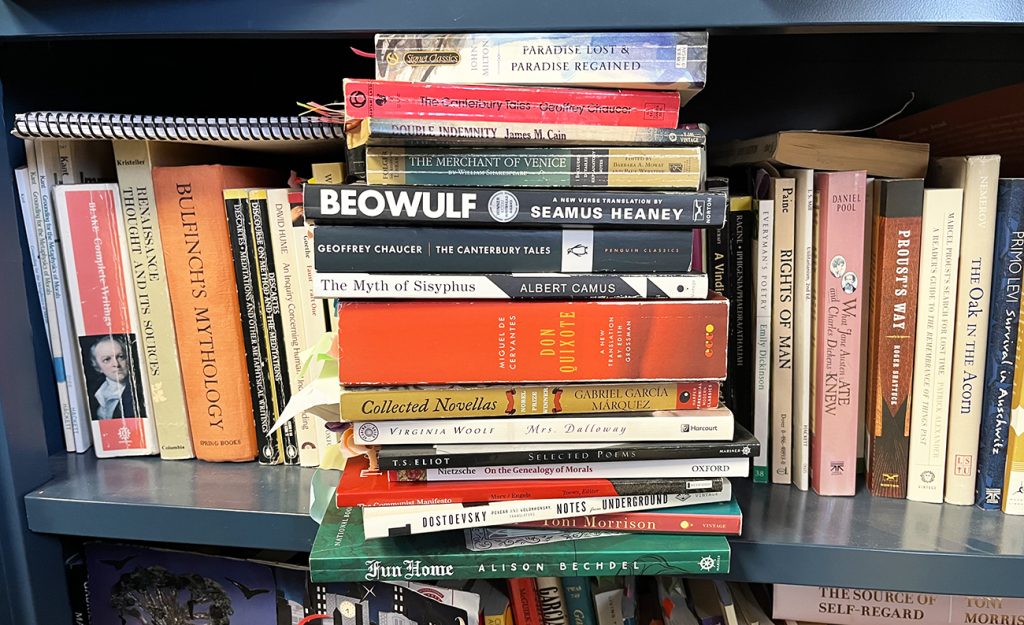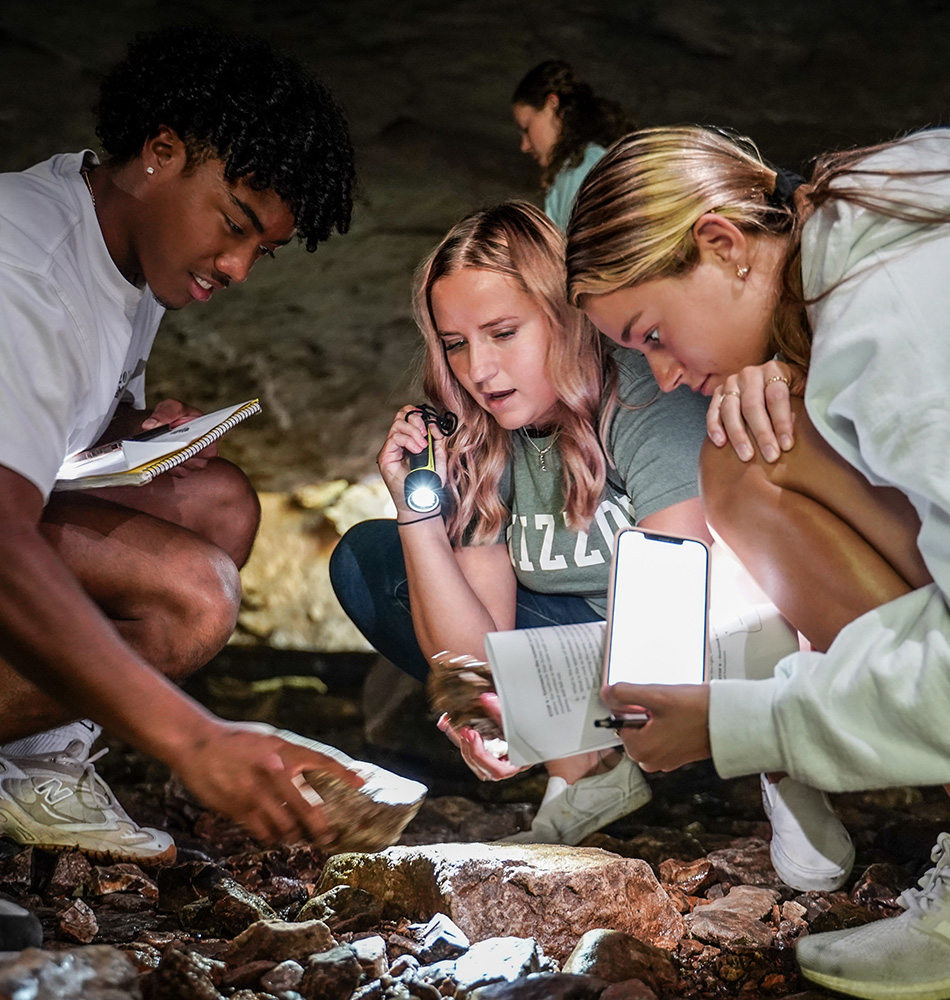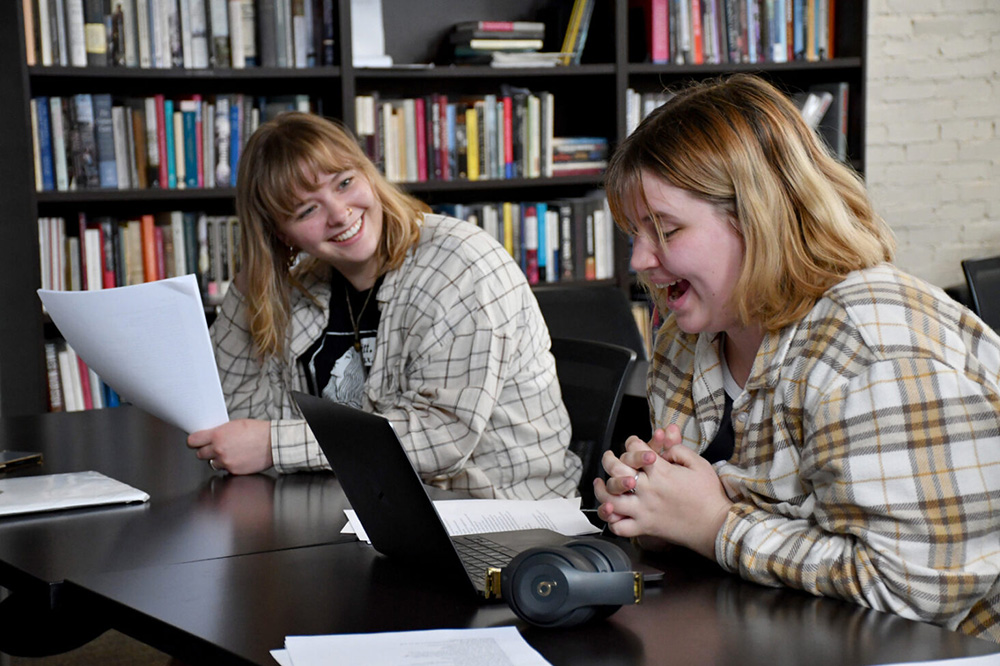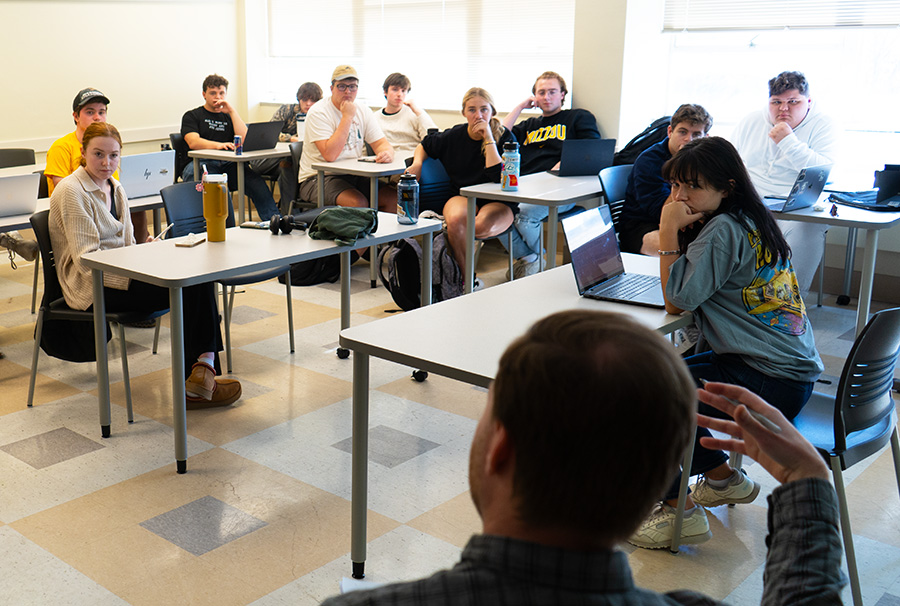Humanities Sequence

The Humanities Sequence is an interdisciplinary, chronologically-structured series of four Honors courses that introduces students to the big ideas, questions, and debates of the Western tradition. The sequence explores works of literature, philosophy, art, history, religion, and music from Homer to Toni Morrison, Plato to Rawls, Praxiteles to Maya Lin, Hildegard of Bingen to Billie Holiday. Although the content of the course is largely within the Western tradition, the sequence does put emphasis, when appropriate, on how these Western works developed in conversation with works from non-Western cultures.
The Humanities Sequence is one of the longest-running courses at the University of Missouri, engaging students since 1954. The four courses in the sequence are taught by MU faculty members (many of them recipients of MU’s highest teaching awards) from more than eight different departments. Weekly guest lectures are followed by small-group discussions in which students share ideas with their professors and other honors students. Each Humanities Sequence course counts towards fulfilling the Humanities General Education requirements for all schools and colleges at Mizzou.
Humanities Sequence Courses
Exploring the art, literature and philosophy of the ancient Mediterranean world, this course will take us from the fall of Troy to the flowering of art, poetry and magic throughout the Roman Empire. We’ll encounter tragic heroes, a suffering Job, Socrates, his student Aristotle, and the great Roman poets Virgil and Horace. We’ll descend to the underworld at least twice, discover the origin of the phrase carpe diem and witness the Roman invention of concrete. Along the way, we’ll find ourselves asking not simply what the Ancients believed, or under what circumstances and in what social and historical contexts the works of the ancient Mediterranean world were composed or performed, but also how they continue to shape and influence our modern world. This is the first course in the long-running Honors Humanities Sequence.
Exploring the art, literature, music, and philosophy of the medieval and renaissance periods, this course opens in North Africa during the late Roman Empire on the threshold between the classical and medieval eras, and it closes in Shakespeare’s London during the English Renaissance. In between, we’ll explore the fens of Beowulf’s Denmark, the battlefields of Roland and Charlemagne, and Hell itself in Dante’s Inferno; meet werewolves and dragons and pilgrims; navigate the intellectual, political, and religious turmoil of medieval Europe; and encounter the glory of Renaissance Italy.
Exploring the art, literature, music, and philosophy of the early modern world, this course will take us from the delirious hills of La Mancha in 17th century Spain to a desperate slave ship in the South Pacific in the mid-19th century. Along the way, we’ll ponder our existence in a bread oven in the Netherlands, bathe in a lake of fire in Hell, confront the squalor of 18th century London, explore the perils of home schooling from Switzerland to the Arctic ice, brave Romantic madness in Germany and Russia, and be peered at by New England mermaids.
Exploring the art, literature, music, and philosophy of the modern era, this course will take us from the intellectual and social revolutions of the mid-19th century to the cusp of the 21st century. Along the way, we’ll encounter countries haunted by war and cities haunted by racism and crime. We will witness modernist revolutions in seeing and making and even glimpse the dawn of the digital age and the first hint of the possibility of artificial intelligence. In the shadow of such events, the traditional themes of the Humanities — the problem of evil, the puzzle of human nature, the challenge of right action, the quest for justice, the mystery of love, our ethical and social responsibilities, and the continual search for a voice and an art adequate to our experience — resonate from work to work throughout our era.
__________________________________________________________________________________________________________
Sciences Sequence

The two courses with the Sciences Sequence are designed to introduce students to some of the important big ideas in science. These courses integrate innovative ideas from biology, astronomy, chemistry, geology, and physics, and explore their importance in today’s world. With exciting lectures, labs, discussions, and small group activities, these two courses have no prerequisites and fulfill the General Education requirement for a lab science course.
These course have no prerequisites. They are designed for non-science majors. Science majors are welcome but should be aware that the courses do not count toward their major course requirements.
The courses are designed with these guiding principles:
- Every student can enjoy science, regardless of his or her background.
- Science knowledge is always changing and everybody can learn more.
- Science literacy is imperative to be an informed citizen.
- Doing science is a fun and creative process!
Sciences Sequence Courses
This course covers how the world was made, how environments formed, how life evolved, and how it all works together to sustain our life on Earth. We will explore the big ideas of birth, change, cycles, connections, and how we interact with the natural environment in a combination of lectures, discussions, and labs. We’ll also examine the nature of science and how science issues are covered by the media.
This course explores the world of particles and forces and how they work together to form the world around us. In a combination of lectures, discussions, and labs, we’ll talk about and experiment with big ideas including thermodynamics, the laws of motion, electricity, magnetism, atoms and molecules, and even the nature of science itself. Woven throughout the course are discussions of how things as small as microorganisms and as large as human civilizations use the energy available to them, and the implications of that use for the future.
__________________________________________________________________________________________________________
Behavioral Sciences Sequence

The Behavioral Sciences Sequence provides students with an interdisciplinary introduction to the human sciences, and draws on perspectives from anthropology, economics, geography, history, political science, psychology, and sociology.
The Behavioral Sciences Series is founded on a set of principles including an emphasis on interdisciplinary thinking, writing, and engagement with key texts and “big ideas” from a variety of fields. Philosophically, this series aims at enabling both objective and subjective approaches to the subject of human nature, allowing students and faculty to address questions like, “How do I make sense of myself?” in one course and, “What selective pressures during human evolution shaped our ability to cooperate?” in another. The specific content of each course will differ, depending on the instructor.
Behavioral Sciences Sequence Courses
This multidisciplinary course will tackle issues of personal identity from numerous behavioral science perspectives. Topics include identity development, interactional identity, embodiment, and much more. Meets general education requirement for behavioral sciences.
This course examines social relations, inclusions, and inequality on the American college campus. College represents a period of life in which young adults are expected to start forming their own relationships. These social relations, however, are not merely chosen. They are shaped by historical-structural forces as much as by their own wants and needs. This multidisciplinary course explores systems of stratification on college campuses and the behavioral and social scientific theories underpinning their construction, reproduction, and alteration. Meets general education requirement for behavioral sciences.
__________________________________________________________________________________________________________
Revolutions and Constitutions (Social Sciences Sequence)

The Social Sciences Sequence offers two courses to provide a complete picture of revolutions and constitutions in their historical and political contexts. These courses are taught by historians and political scientists, supplemented by speakers from a range of disciplines, from theater to Black studies. This series is taught in partnership with the Kinder Institute on Constitutional Democracy.
Revolutions and Constitutions (Social Sciences Sequence) Courses
An in-depth look at the American Revolution, this course has two primary goals – to understand revolutions not as heroic endeavors but as messy, complicated affairs that introduce new problems as they solve old ones and circumscribe liberties for some as they secure them for others; and to think, in a global sense, about how revolutionary goals and movements not only feed off one another, but also diverge from one another to fit the needs and oppressive circumstances of different polities.
Constitutions shape practically every aspect of modern life. In the United States, the federal Constitution not only defines a political community – “We the People” – it also articulates laws, enumerates rights, scaffolds how we debate justice, and even helps outline principles for living a good life. Yet, we rarely stop to consider what a constitution is, how the idea of constitutions emerged, or what constitutions seek to achieve. This course invites students to explore these questions through an interdisciplinary examination of how early American constitution-making connects with and compares to a global history of constitutions.